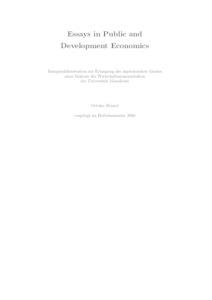|
Essays in public and development economics
Briand, Océane
![[img]](https://madoc.bib.uni-mannheim.de/43678/1.hassmallThumbnailVersion/Thesis%20Oceane%20Briand%209.1.2018.pdf)  Vorschau |
|
PDF
Thesis Oceane Briand 9.1.2018.pdf
- Veröffentlichte Version
Download (5MB)
|
|
URL:
|
https://madoc.bib.uni-mannheim.de/43678
|
|
URN:
|
urn:nbn:de:bsz:180-madoc-436783
|
|
Dokumenttyp:
|
Dissertation
|
|
Erscheinungsjahr:
|
2017
|
|
Ort der Veröffentlichung:
|
Mannheim
|
|
Hochschule:
|
Universität Mannheim
|
|
Gutachter:
|
Janeba, Eckhard
|
|
Datum der mündl. Prüfung:
|
16 Januar 2017
|
|
Sprache der Veröffentlichung:
|
Englisch
|
|
Einrichtung:
|
Außerfakultäre Einrichtungen > GESS - CDSE (VWL)
Fakultät für Rechtswissenschaft und Volkswirtschaftslehre > Finanzwissenschaft u. Wirtschaftspolitik (Janeba 2004-)
|
|
Fachgebiet:
|
330 Wirtschaft
|
|
Fachklassifikation:
|
JEL:
H26, H32, O17, O23, O33,
|
|
Normierte Schlagwörter (SWD):
|
Energie- und Umweltpreis , Indirekte Steuer , Registrierung
|
|
Freie Schlagwörter (Englisch):
|
VAT , India , Informality , Energy-efficiency
|
|
Abstract:
|
This thesis addresses two issues at the crossroads of Public and Development Economics: the impact
of policies on the informal sector on the one hand and on the level of negative externalities caused
to the environment by economic activities on the other. All empirical analyses use Indian data and
exploit the Indian economic and political context to test the theoretical predictions developed in
the different chapters of this dissertation. India has become the focus of much attention in the last
decade. First, it is the largest democracy in the world but it is also home to the largest absolute
number of poor in 2012. Second, the environmental consequences of economic development in
this country have already triggered migrations, worsened poverty and exacerbated ethnic conflicts.
Third, India's ability to face the challenges in its path towards sustainable development will impact
the global economy: the size of its consumer market and the growing role taken by Indian firms in the
international value chain simultaneously represent an opportunity and a threat to existing players.
This thesis contributes to a better understanding of how Indian fiscal policies impacted the inclusion
of the most disadvantaged into the formal economy and influenced the environmental footprint of
economic agents. However, the policy implications of the results presented here are not limited to
India or to developing countries, but are also pertinent for advanced economies facing growing social
inequalities, fiscal constraints, and greater awareness of environmental problems.
|
 | Dieser Eintrag ist Teil der Universitätsbibliographie. |
 | Das Dokument wird vom Publikationsserver der Universitätsbibliothek Mannheim bereitgestellt. |
 Suche Autoren in Suche Autoren in
Sie haben einen Fehler gefunden? Teilen Sie uns Ihren Korrekturwunsch bitte hier mit: E-Mail
Actions (login required)
 |
Eintrag anzeigen |
|
|
